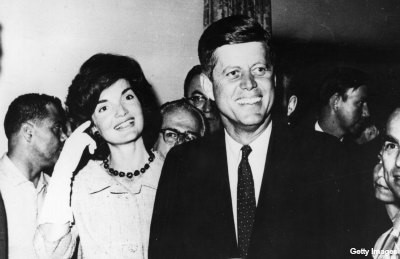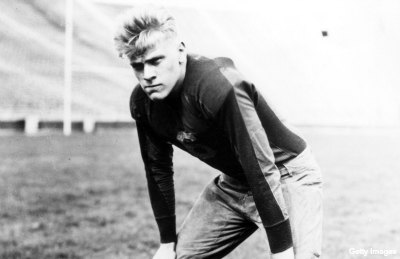College football's history is dotted with cameos from U.S. presidents. Teddy Roosevelt got the ball rolling in the early 1900s by helping usher in rules changes to make the game safer. In 1905 alone, 18 people died playing football, and Roosevelt's own son suffered a serious injury while playing for Harvard.
Roosevelt was a devoted fan of football, but even its early days were too much for the famously rugged president.
"I believe in outdoor games, and I do not mind in the least that they are rough games, or that those who take part in them are occasionally injured," he said at the time, according to The Washington Post. But football at that time was a bloodbath. Roosevelt helped rein in the violence, laying the foundation for the modern iteration of the sport.
Roosevelt may have been the most important U.S. president in college football history, but he never played himself. A few others, however, did. In the 20th century, four college football players went on to become POTUS, as well as a fifth who participated on the JV level:
Dwight Eisenhower: Ike originally wanted to be a baseball player, but he couldn't make the team at West Point. Instead, he joined the football team. His football career began at 1911, and he arrived at school standing just 5-foot-11 and weighing just 152 pounds. Even by the standards of the time, he was an undersized athlete, but he became one of Army's two-way stars, playing both linebacker and running back.

John F. Kennedy: JFK only gets half-credit here. Although he did play football at Harvard, he never made it past the junior varsity level. According to Pro Sports Experience, his football career ended after his freshman year, when a combination of illness and injury forced him to the sideline.
The Kennedys remained a visible family of football fans, though, and two of JFK's brothers were varsity football players at Harvard.
Richard Nixon: Nixon had a quiet college football career, backing up at tackle for Whittier College's football team. His largest contribution to football is a legend called "Nixon's Play," in which a play the president recommended to Redskins coach George Allen caused the franchise to lose a playoff game in 1971.
The rumor hasn't been confirmed, but given the course of Nixon's political career, it continues to serve as an apt anecdote.

Gerald Ford: Ford was easily the most accomplished college football player among the other U.S. presidents. Ford was one of the best player on Michigan's football team in the early 1930s. He turned down an offer to play professionally for the Green Bay Packers, choosing instead to coach at Yale while applying to law school.
In that way, his football career helped launch his political aspirations.
Ronald Reagan: Reagan was a lineman for little-known Eureka College in Illinois, but he'll be forever associated with his role as Notre Dame's George Gipp in the 1940 movie Knute Rockne, All American.
During his presidential campaigns 40 years later, he used a famous line for the movie -- "win one for the Gipper" -- as a campaign slogan:





